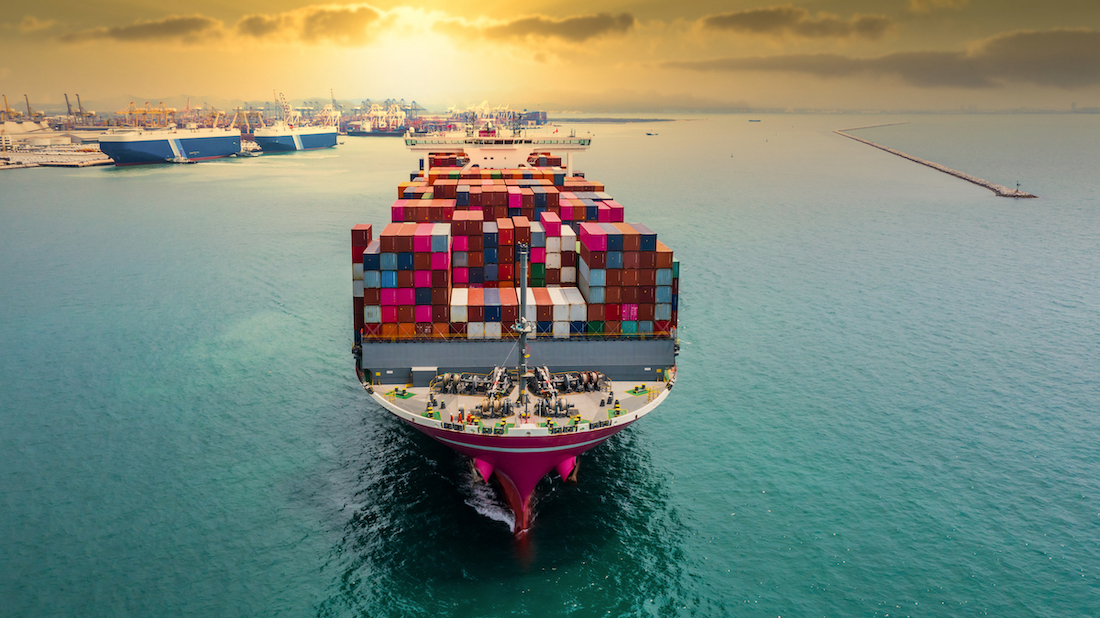
At the beginning of October 2022, the Federal Maritime Commission (FMC) finished accepting public comments in response to their Maritime Transportation Data Initiative (MTDI) and the proposal for new data collection. The FMC will review these comments, continually working with stakeholders as it progresses toward rulemaking and further implementing the Ocean Shipping Reform Act (OSRA).
The forthcoming rules will require marine terminal operators to adapt their current data communication and management practices, posing some challenges despite the greater benefits predicted for the industry. Given the significant changes under discussion, we’ve put together a guide on the MTDI — what it is, its objectives, what stage it’s at, and its potential impacts for marine terminal operators.
What Is the Maritime Transportation Data Initiative?
The Maritime Transportation Data Initiative is the current effort by the FMC to create better data communication and management processes throughout the shipping industry. This initiative and the creation of common data standards are significant to OSRA’s broader effort to prevent the recurrence of recent supply chain disruptions.
Marine terminals can better prepare and schedule resources, such as yard space, workers, and equipment, with more complete and accurate data.
While marine terminals and other parties already collect the necessary information, some current challenges prevent greater efficiency.
- There’s too much data.
- The data isn’t sanitized — meaning it’s not consistently categorized or structured.
- The data is often out of date.
- Much of the data is siloed rather than shared, only existing in certain systems or possessed by individual parties.
The FMC formed recommendations following conversations with industry stakeholders and after a series of meetings earlier this year. Many of these meetings were open sessions now accessible via the FMC’s YouTube channel. The channel also hosts many informational sessions regarding the MTDI. The most notable recommendations include real-time transportation data synchronized across systems and the involved parties continuing to manage their data systems, with the FMC specifying what must be reported and how it’s to be standardized.
Who Is Involved in the Conversation and Rulemaking?
As the agency responsible for overseeing the implementation of OSRA, the Federal Maritime Commission is leading the MTDI discussion — particularly Commissioner Carl W. Bentzel and Chairman Daniel B. Maffei. In addition, the FMC has involved numerous industry stakeholders at every stage of the process.
The FMC has held MTDI meetings since December 2021, including stakeholders involved with:
- Drayage Trucking
- Warehouse/Distribution Centers/3PL Industry
- Beneficial Cargo Owners
- Chassis Industry
- Railroad Industry
- Federal Partners (USDOT/CBP/Commerce/Agriculture)
- Ocean Transportation Intermediaries (Forwarders and NVOCCs)
- UPS/FedEx/Amazon
- Large Aggregators (Flexport/Expeditors/C.H. Robinson)
- Maritime Labor
- Marine Terminal Operators
- International Standards/FMC Agreements
- Ocean Carriers
How MTDI Relates to OSRA
The MTDI is an effort the FMC is pursuing as part of its data reporting obligations under OSRA. Quarterly reports must be made available to the public concerning:
- Total import and export tonnage
- Total loaded and empty 20-foot equivalent units per vessel
This data must be provided monthly by ocean common carriers.
 The Current State of Data Sharing
The Current State of Data Sharing
Following its series of meetings with industry stakeholders, the FMC determined ocean common carriers and other entities like marine terminals already store the required data. However, the challenges listed above — too much data, non-standardized data, out-of-date data, and silos — currently prevent data sharing from being effective or timely. And the recent supply chain disruptions have shown how problematic this is.
There are four main obstacles to efficient data sharing in the marine and intermodal shipping industry:
- Accuracy between entities and systems: Currently, it’s not uncommon for the data used by different entities to be inconsistent (e.g., whether or not a container is available for pickup)
- Timeliness: Once the inaccurate data is fixed, there are often not enough resources scheduled and available to handle the tasks (e.g., no available truckers to pick up the container)
- Data remains subject to change: Entities cannot plan in advance because the status of ships, containers, and other resources may be changed at the last minute, leading to complications and delays (e.g., a ship’s earliest return date (ERD) changes.)
- Siloed systems and non-standardized data: There is currently no universal API for entities’ systems to communicate through, and no industry data standard or nomenclature that they all follow. This is because the data has primarily been shared exclusively between partnered entities.
The Objectives of MTDI
As the solution to marine transportation data challenges, the MDTI seeks to:
- Evaluate and catalog the industry’s current practices — data elements, metrics, data transmission, and access.
- Determine critical gaps and inconsistencies with marine data definitions, classifications, and general terminology.
- Formalize FMC recommendations for common data standards and access governance.
Marine terminals should note that the MDTI is not seeking to develop a universal system to replace current data management. Instead, the initiative aims to determine how to utilize existing data and to leave management in control of individual entities.
Proposed Requirements of MTDI
So far, Commissioner Bentzel and those involved at the FMC have provided the following recommendations:
For Ocean Carriers
Ocean carriers will be responsible for maintaining and making available:
- Real-time in-transit visibility and status with the estimated time of arrival
- Real-time information on ERD
- Subsequent intermodal handling as per service provider
For Marine Terminal Operators
Marine terminal operators will be responsible for open-facing data (available via public internet), including:
- Real-time information on loading and unloading operations
- Real-time ERD data per ocean carrier
- Terminal operations must be posted by 3pm the previous day, and any changes must be synced in real time
- Synchronized appointment policies
They will also be responsible for closed-facing data managed on private, internal systems, including notice of:
- Availability or unavailability
- Government inspections
- Transfers, gate in, and gate out
- Changes in detention and demurrage (D&D) responsibilities
For Port Operations
Port operations will be responsible for:
- General data repositories, especially those concerning ocean carriers, marine terminal operators, and intermodal cargo carriers
- Logistics for drayage and intermodal equipment providers (IEPs)
- Data on large warehousing and distribution services and their availability
For Drayage and Trucking Services
Drayage and trucking services must manage and make accessible:
- Assessments of drayage and chassis services
- Assessments of adequacy of services to port complex
- Advanced notices of special conditions
- A forum to harmonize efficiency
For Inland and Warehouses
Inland operations and warehouse must make available:
- Hours-servicing ports
- Special conditions
- Service restrictions or enhancements
For Intermodal Rail
Intermodal rail operators will provide real-time data on:
- Facilities handling substantial volumes of intermodal cargo
- Departure and arrival information (8-12 hours advance notice)
- Facility operations-hours, operation, and restrictions on access and for pick up or delivery information
 Potential Impacts for the Industry and Terminal Operators
Potential Impacts for the Industry and Terminal Operators
The impacts that the MTDI and OSRA stand to have on the marine transportation industry are significant. Overall, open data sharing and standardization will provide major efficiency improvements for all parties involved — and hopefully prevent another significant supply chain disruption.
Specifically, entities and stakeholders benefit from:
- Standardized and real-time data: Access to real-time data will immediately improve planning and flexibility, creating a more fluid and resilient system that enables entities and stakeholders to avoid bottlenecks.
- Improved communication: The FMC intends to make all data related to scheduling easily accessible between entities involved with marine and intermodal shipping, with advanced notice on current estimates and real-time changes. This access will increase coordination between all parties.
- More complex data management: Comments provided by one stakeholder suggested mining manifest data. However, he also acknowledged that more advanced systems and complex data management would be necessary for insights like cargo storage availability and scheduling to prevent unnecessary handling that would increase delays and disruptions.
- Replacing legacy systems: Many of the decades-old systems currently in use by marine terminals and other parties may not be able to perform as needed and adapt to the MTDI’s recommendations. Operators will benefit from new technology, but two primary challenges remain. The first is the implementation costs, although the more significant issue is replacing legacy systems without that effort disrupting operations. Integration must occur while operations continue.
What’s Coming Next?
Per the FMC’s update provided at the beginning of August 2022, the MTDI has accomplished:
- The development of a Notice of Proposed Rulemaking on Unreasonable Refusal to Deal or Negotiate on Vessel Space Accommodations has begun.
- The Interim process for submitting Charge Complaints has been established.
- The creation of the Bureau of Enforcement, Investigations, and Compliance will help oversee enforcement.
- Notice has been distributed throughout the industry that all of OSRA’s self-executing provisions take effect immediately.
- Notice has been distributed that common carriers must adhere to the new detention and demurrage billing practices immediately.
- Fact Finding 29 Final Report has been published.
- The resources and oversight capabilities of the Office of Consumer Affairs and Dispute Resolution Services have been expanded.
- (Most recently) The 60-day Request for Public Comment period has concluded, with the FMC currently reviewing submissions.
Following the review of public comments on their recommendations, Commissioner Bentzel and those involved with the MTDI will contact participating and affected entities for additional discussions and feedback. The conclusion of this process — expected to last a month or two — will culminate in the presentation of the finalized MTDI recommendations. If approved, the FMC will proceed to the rulemaking stage.
Navigate the MTDI Changes With Tideworks
It’s an understatement to say global logistics are challenging. And while the MTDI’s coming recommendations should benefit those in the industry long-term, adaptation may pose a short-term challenge for many marine terminal operators.
At Tideworks, we’re here to help you manage these new OSRA compliance obligations through cutting-edge systems.
As one of the leading providers of terminal operating systems solutions for marine and rail terminals, our team will help you stay one step ahead of the coming changes to data standardization and sharing.
Contact us today to see how we can help you get prepared for the MTDI’s recommendations.
